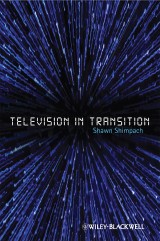Details

Television in Transition
The Life and Afterlife of the Narrative Action Hero1. Aufl.
|
29,99 € |
|
| Verlag: | Wiley-Blackwell |
| Format: | |
| Veröffentl.: | 05.02.2010 |
| ISBN/EAN: | 9781444320688 |
| Sprache: | englisch |
| Anzahl Seiten: | 256 |
DRM-geschütztes eBook, Sie benötigen z.B. Adobe Digital Editions und eine Adobe ID zum Lesen.
Beschreibungen
Combining an exciting methodology alongside high-interest case studies, <i>Television in Transition</i> offers students of television a guide to a medium that has weathered the challenges of first-run syndication, a multi-channel universe, netlets, major media conglomerates, deregulation, and globalization--all in the space of twenty years. <ul> <li>Examines a return in television programming to action narratives with individual (super) heroes intended to navigate this new, international, multi-channel universe</li> <li>Explores how television programming "translates" to new spatial geographies: different nations, cultures, broadcast systems; and different formats, distribution outlets, and screen sizes</li> <li>Looks at the value of a program's "afterlife," the continued circulation, repackaging and repurposing of programming beyond its initial iteration</li> <li>Blends institutional and textual analyses in case studies of<i> Highlander: The Series, Smallville, 24,</i> and <i>Doctor Who</i></li> </ul>
Acknowledgments. <p>Introduction: The Time and Space of Television in Transition.</p> <p>1 Television in Transition.</p> <p>2 The Hero.</p> <p>3 How to Watch Television.</p> <p>4 Highlander: The Immortal Cosmopolitan.</p> <p>5 Smallville: "No Flights, No Tights": Doing Business with Superman.</p> <p>6 24: In Real Time.</p> <p>7 Doctor Who: Regeneration through Time and (Relative Dimensions in) Space.</p> <p>Conclusion: Do We Need Another Hero?</p> <p>Notes.</p> <p>References.</p> <p>Index.</p>
"Shawn Shimpach's Television in Transition is a timely and original study of the complex industrial and textual dynamics of contemporary televisoin production. . . Like the industry it examines, Television in Transition's thesis is multifaceted, but Shimpach does an excellent job in guiding the reader through the new narratives and spatio-temporal configurations of TVIII." (Popular Communication, 12 July 2011)<br /> <br />
<b>Shawn Shimpach</b> is Assistant Professor in the Department of Communication at the University of Massachusetts, Amherst. His research has appeared in the online scholarly fourm FLOW, as well as in many journals, including <i>Social Semiotics</i> and <i>Cultural Studies</i> and in the collectin <i>Media and Public Sphere</i>.
From a few national broadcasters to hundreds of digital channels and from a box in the living room to screens of every size, everywhere, television looks and feels very different now. Today television programming must "translate" to different nations, cultures, broadcast systems; different formats, distribution outlets, and screen sizes, while simultaneously attracting and sustaining audience interest over the time it takes to travel through these spaces. <p>Blending institutional and textual analyses, <i>Television in Transition</i> examines the return to action narratives with individual (super) heroes intended to navigate this new, international, multi-channel universe. Case studies of <i>Highlander: The Series,</i> <i>Smallville</i>, <i>24,</i> and <i>Doctor Who</i> call up new questions of political, economic and cultural citizenship, crossing borders, splitting affinities, and pushing boundaries through reinterpretations of long-time televisual representational themes (white masculinity, heroism, nation, genre, etc.) within this era of transformation and perceived industry crisis.</p> <p><i>Television in Transition</i> examines the narrative and institutional paradigms of textual afterlife to offer a highly original explanation of how innovation takes place within the television industry's management of predictability, risk, and familiarity.</p>
"Shimpach’s canny book shows how these uncertain times reveal a cultural and corporate desire––in on-screen heroics and industrial antics alike––to “save” television ... even as it transforms before our very eyes." <i>John Hartley, author of</i> “Television Truths” <p>"With trenchant insight and far-reaching interpretation, Shawn Shimpach confronts transformations in the media landscape that dramatically are changing the fundamental experience of TV today. Most impressively, he demonstrates richly productive ways to combine industry analysis with close reading of individual programs in order to account for continuities and breaks in what television now means in our everyday life. This is destined to be a major work in television studies." <i>Dana Polan, Cinema Studies, New York University author of</i> The Sopranos <i>(Duke University Press)</i> <i>and</i> Julia Child's The French Chef <i>(forthcoming, Duke)</i></p> <p>"Shimpach has written a smart and savvy book that connects the new industrial configurations of American television to the texts it produces. He examines aesthetics, narrative, and genre while accounting for the ideological workings of gender and incorporating an international perspective." <i>Roberta Pearson, University of Nottingham</i><br /> </p> <p>"Shimpach eloquently describes the impact of new global business forces in the TV industry through an insightful examination of four different kinds of heroes. His analysis reveals new ways to think about what stories TV can tell about heroism in the 2000s." <i>Sharon Ross, Columbia College Chicago</i></p>

















